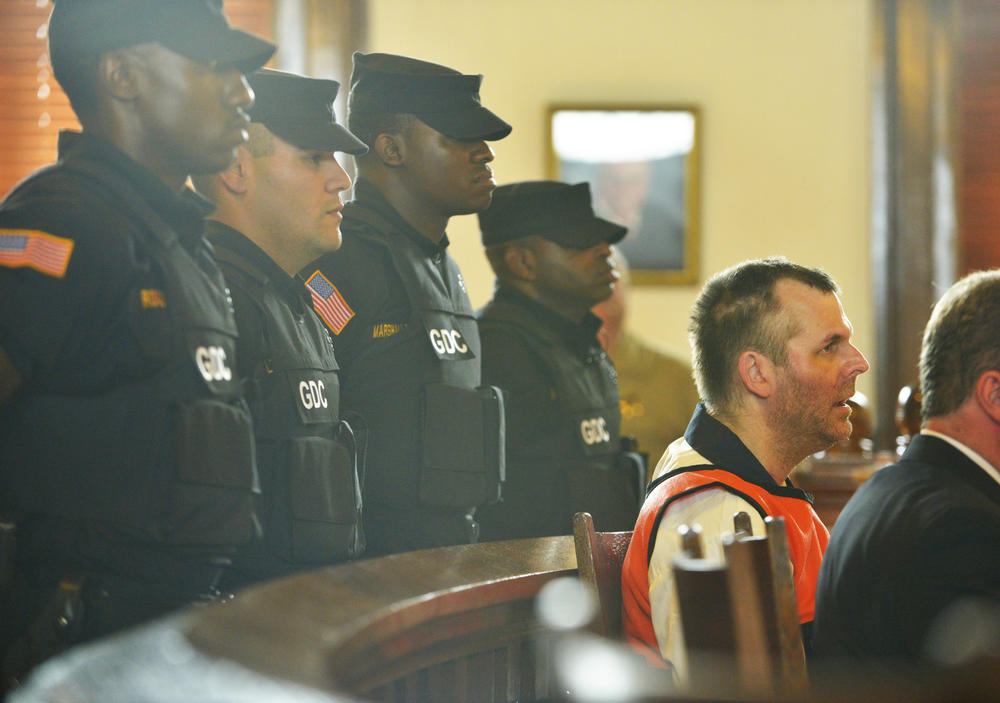
Section Branding
Header Content
Monroe County Mourns Slain Deputy
Primary Content

It began as a suicide call.
Monroe County Deputies Michael Norris and Jeff Wilson were called to a home in a small neighborhood in an otherwise rural part of the county.
There they found Christopher Keith Calmer at his parents’ home. What happened next is unclear. What is clear is that there was a gunfight.
Calmer was shot in the leg. Deputy Wilson was shot in the legs as well. Deputy Norris was fatally shot in the head.
The day after Norris donated his organs and officially died, Christopher Keith Calmer had his first day in court.
Calmer shuffled into the courtroom at the Monroe County Courthouse surrounded by five deputies and four black clad corrections officers. His hands were encased and chained in protective mittens and an IV port hung from his arm -- a remnant of treatment he received.
This court appearance was quick. Charges were read: among them, murder for the killing of Deputy Norris and attempted murder for the shooting of Deputy Wilson. Calmer was read his rights, briefly unshackled to sign documents, and then led out.
After the hearing, Sheriff Bittick explained why, as hard as it is to lose an officer, it’s especially hard in Monroe County. Bittick’s relationship with the Norris family didn’t start when Michael Norris went on patrol.
“I’m the fourth person in my family to be Sheriff. Norris’ family and my family go back three generations,” Bittick said.
That’s a common relationship here -- one that, Bittick says, makes his agency more family than business. And members of this family are taking Norris’ death hard.
Outside the courthouse, flags fly at half mast. Across the street, in front of the U Save it Pharmacy, is a box for the weekly newspaper, the Monroe County Reporter. A huge photograph on the page shows a man running away from a rampant horse that was loose on the Interstate. Standing calmly behind the massive animal with a lasso in hand is deputy Michael Norris.
Will Davis is the executive editor and publisher of the Monroe County Reporter. He took the photo.
“They were trying to hem him in. He was in a powerline area right by the interstate. They’d gotten him off the interstate. Micheal and Kevin, the two deputies worked for three hours to try and corral him,”
Davis says most people probably don’t think of errant livestock when they dream of a life in law enforcement.
”They probably think of the glamourous the glorified hunting down bad guys. But here he was. This wasn’t one of the glorious times of law enforcement to try and corral a horse. But he was taking it seriously and trying his best to do it,” Davis said.
Michael Norris’ name popped up a lot in the police incident reports that the paper typically publishes. On the Tuesday before his death, Norris responded to the first of two suicide calls he’d see that week.
Norris’ report describes talking to the father of a troubled 18-year-old who had been smoking synthetic marijuana for days. Norris wrote about his conversation with the teenager.
“I asked him if he had any thoughts of suicide or if he felt depressed in any way,” Norris wrote, “He was adamant that he was not suicidal.”
Norris worked with the parents to find their son another place to live and convinced them to get a court order to get their him into mental health treatment.
The Georgia Bureau of Investigations is still investigating the second suicide call -- the one that led to Norris’ death.
A candlelight vigil for Norris will be held Wednesday in Forsyth. Norris’ funeral will be Friday at the Georgia Public Safety Training Center.
Tags: Grant Blankenship, crime, courts, law, guns, Forsyth, Georgia
